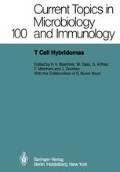Abstract
An important criterion for the use of T cell hybridomas in the study of immune responses or as a source for antigen receptors or cell recognition structures is the ability to clearly demonstrate normal immune response parameters. In studying the T cell response to cytochrome c, we have been able to show that the fine specificity of cytochrome c specific T cell hybrids resembles the response of normal T cells to this antigen. Furthermore, by holding the T cell constant we have been able to study the interaction of antigen-Ia-T cell in a way which has revealed some interesting results dealing with T cell activation and Ir gene defects.
Access this chapter
Tax calculation will be finalised at checkout
Purchases are for personal use only
Preview
Unable to display preview. Download preview PDF.
References
Solinger A.M., M.E. Ultee, E. Margoliash, R.H. Schwartz (1979) The T-lymphocyte proliferative response to pigeon cytochrome c. I.Demonstration of a T-cell heteroclitic response and identification of a single antigenic determinant whose immune recognition requires two complementing MHC-linked immune-response genes. J. Exp. Med. 150: 830
Ultee M.E., E. Margoliash, A. Lipkowski, G. Flouret, A.M. Solinger, D. Lebwohl, L.A. Matis, C. Chen, R.H. Schwartz (1980) The T lymphocyte response to cytochrome c.II.Molecular characterization of a pigeon cytochrome c determinant recognized by proliferating T lymphocytes of the B10. A mouse. Mol. Immunol. 17: 809
Hansburg D., C. Hannum, J.K. Inman, E. Appella, E. Margoliash, R.H. Schwartz (1981) Parallel cross-reactivity patterns of 2 sets of antigenically distinct cytochrome c peptides: Possible evidence for a presentational model of Ir gene function. J. Immunol. 127: 1844
Merrifield, R.B. (1969) Solid-phase peptide synthesis. Adv. Enzm. 32: 221
Heber-Katz, E., R. H. Schwartz, L. Matis, C. Hannum, T. Fairwell, E. Appella, D. Hansburg (1982) The Contribution of antigen presenting cell la to antigen-specific T cell activation. J. Exp. Med. in press
Julius, M.H., E. Simpson, L.A. Herzenberg (1973) A rapid method for the isolation of functional thymus-derived murine lymphocytes. Eur. J. Immunol. 3: 645
Rosenwasser, L.J., A.S. Rosenthal (1978) Adherent cell function in murine T lymphocyte antigen recognition.I.A macrophage dependent T cell proliferation assay in the mouse. J. Immunol. 120: 1991
Corradin, G., H.M. Etlinger, J.M. Chiller (1977) Lymphocyte specificity to protein antigens.I.Characterization of the antigen-induced in vitro T cell-dependent proliferative response with lymph node cells from primed mice. J. Immunol. 119: 1048
Click, R.E., L. Benck, B.J. Alter (1972) Immune responses in vitro.I.Culture conditions for antibody synthesis. Cell. Immunol. 3: 264
Gefter, M.C., D.H. Margulis, M.D. Scharff (1977) A simple method for poly ethylene glycol-promoted hybridization of mouse myeloma cells. Somatic Cell Genet 3: 231
Ozato, K., N. Mayer, D.H. Sachs (1980) Hybridoma cell lines secreting monoclonal antibodies to mouse H-2 and la antigens. J. Immunol. 124: 533.
Farrar, J.J., P.L. Simon, W. J. Koopman, J. Fuller-Bonar (1978) Biochemical relationship of thymocyte mitogenic factor and factors enhancing humoral and cell-mediated immune responses. J. Immunol 121: 1353
Harwell, L., B. Skidmore, P. Marrack, J. Kappler (1980) Concanavalin A- inducible,interleukin-2 producing T cell hybridoma. J. Exp. Med. 152: 893
Kappler, J.W., B. Skidmore, J. White, P. Marrack (1981) Antigen-inducible, H-2-restricted, interleukin-2-producing T cell hybridomas: Lack of independent antigen and H-2 recognition. J. Exp. Med. 153: 1198
Longo, D.L., L.A. Matis, R.H. Schwartz (1981) Insights into immune response gene function from experiments with chimeric animals. Crit. Rev. Immunol. 2: 83
Editor information
Editors and Affiliations
Rights and permissions
Copyright information
© 1982 Springer-Verlag Berlin Heidelberg
About this paper
Cite this paper
Heber-Katz, E., Hansburg, D., Schwartz, R.H. (1982). The Effect of Antigen Presentation on the Fine Specificity of Anti-Cytochrome c T Cell Hybridomas. In: Boehmer, H.V., Haas, W., Köhler, G., Melchers, F., Zeuthen, J. (eds) T Cell Hybridomas. Current Topics in Microbiology and Immunology, vol 100. Springer, Berlin, Heidelberg. https://doi.org/10.1007/978-3-642-68586-6_14
Download citation
DOI: https://doi.org/10.1007/978-3-642-68586-6_14
Publisher Name: Springer, Berlin, Heidelberg
Print ISBN: 978-3-642-68588-0
Online ISBN: 978-3-642-68586-6
eBook Packages: Springer Book Archive

